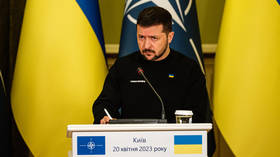‘All’ NATO members support Ukraine membership – Stoltenberg
Hungary asked questions the last time the bloc’s top official made a similar declaration
NATO Secretary General Jens Stoltenberg has told the Washington Post that all member states have agreed to welcome Ukraine after it defeats Russia. He also revealed that the US-led military bloc had started backing Kiev in 2014.
In the interview, conducted last week at the bloc’s Brussels headquarters and published on Tuesday, Stoltenberg told the WP’s editorial staff that “all NATO allies agree that Ukraine will become a member of the alliance.”
“Then the question is when, and I cannot give you a timetable on that,” Stoltenberg added.
The NATO head has made this claim once before, last month when he visited Kiev. This prompted a one-word response from Hungarian PM Viktor Orban, who suggested that the bloc had not actually bothered to obtain consent from Budapest.
Stoltenberg told the Post that NATO was currently helping Kiev “transition from Soviet-era equipment, doctrines and standards” and become “interoperable with NATO forces,” while reforming and modernizing their military and defense institutions.
The urgent task now is to ensure that Ukraine prevails as a sovereign, independent nation, because if Ukraine doesn’t prevail, then there is no issue to discuss at all.
According to Stoltenberg, NATO has two fundamental tasks “in the war,” one being to “support Ukraine,” the other to prevent escalation “by making absolutely clear that we are not party to the conflict.” The deployment of 40,000 troops to eastern Europe is also helping avoid escalation with Russia, he argued.
The former Norwegian prime minister, who has been running NATO since October 2014, also revealed that the US, Canada, and the UK have provided 78% of the bloc’s support to Ukraine, and have been training Kiev’s troops since 2014.
“The war in Ukraine has fundamentally changed NATO, but then you have to remember the war didn’t start in 2022. The war started in 2014,” Stoltenberg told the Post, noting that all members of the bloc have “significantly increased” their military spending since then.
Ukraine’s government was overthrown by US-backed nationalists in a February 2014 coup. The new authorities quickly moved to violently crush any opposition, leading Crimea to seek protection from Moscow. Protests against the coup government were met with a massacre in Odessa, terror in Kharkov, and a “punishment expedition” against Donetsk and Lugansk, which responded by declaring independence.






Comments are closed.